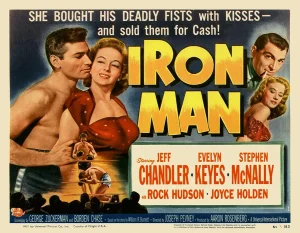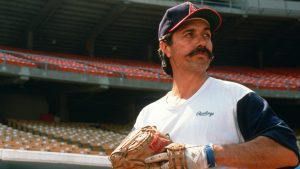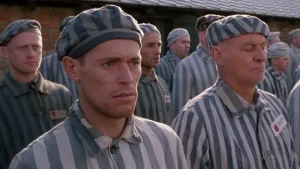
What Is Rollerball (1975) About?
“Rollerball” is a science fiction sports film directed by Norman Jewison and released in 1975. The movie is set in a dystopian future where corporations have replaced governments and control all aspects of society, including entertainment and sports. The titular sport, Rollerball, is a violent and brutal game played on roller skates, where players compete in a circular arena while attempting to score points by throwing a metal ball into a goal.
The story follows Jonathan E., the star player of the Houston team, as he navigates the complex and dangerous world of Rollerball. As Jonathan rises to fame within the sport, he begins to question the oppressive society in which he lives and the motivations behind the corporations’ control of Rollerball. Despite attempts by the corporations to manipulate him and the game, Jonathan remains determined to uncover the truth and challenge the status quo.
“Rollerball” explores themes of individuality, freedom, and the dangers of unchecked corporate power. It is also a commentary on the increasing commercialization of sports and the potential consequences of allowing corporations to dominate all aspects of society.
| Title | Rollerball (1975) |
|---|---|
| Genre | Science Fiction, Sports |
| Director | Norman Jewison |
| Release Year | 1975 |
| Setting | Dystopian future |
| Main Theme | Corporate control, individuality, freedom |
| Plot | In a future where corporations govern society, Rollerball is a violent sport played on roller skates. The protagonist, Jonathan E., rises to fame as a star player but begins to question the oppressive society and corporate control over the sport. He challenges the status quo, leading to a confrontation with the corporations. |
| Commentary | Explores themes of individuality, freedom, corporate power, and the commercialization of sports. |
What Is the Plot of the Movie?
The plot of “Rollerball” (1975) revolves around Jonathan E., the star player of the Houston team in a futuristic society dominated by corporations. The sport of Rollerball is a violent and brutal game played on roller skates, where players compete in a circular arena to score points by throwing a metal ball into a goal.
As Jonathan rises to prominence within the sport, he begins to question the oppressive society in which he lives and the motivations behind the corporations’ control of Rollerball. Despite attempts by the corporations to manipulate him and the game, Jonathan remains determined to uncover the truth and challenge the status quo.
Throughout the film, Jonathan faces various challenges, including attempts on his life and pressure from the corporations to conform. However, he continues to resist and seeks answers about the true nature of the society he lives in and the reasons behind the corporate control of Rollerball.
Ultimately, Jonathan’s journey leads to a confrontation with the corporations, where he defiantly asserts his individuality and refuses to be controlled any longer. The film ends on an ambiguous note, leaving the audience to contemplate the implications of Jonathan’s actions and the future of the society depicted in the film.
Reasons to Watch It
“Rollerball” (1975) is a must-watch for its thrilling action sequences and thought-provoking exploration of themes like individuality and corporate control in a dystopian future, anchored by James Caan’s compelling performance as the rebellious protagonist Jonathan E. Its unique concept, cultural impact, and timeless relevance ensure that it remains an engaging and thought-provoking viewing experience for audiences today.
- Unique Concept:
- The film presents a captivating dystopian future where corporations have replaced governments, and the sport of Rollerball serves as a metaphor for societal control and manipulation.
- Action and Thrills:
- “Rollerball” features intense and adrenaline-pumping action sequences, particularly during the Rollerball games themselves, which are fast-paced and visually striking.
- Thought-Provoking Themes:
- The film explores complex themes such as individuality, freedom, corporate power, and the consequences of unchecked capitalism. It offers plenty of material for viewers to ponder long after the credits roll.
- Cinematic Style:
- Director Norman Jewison’s vision brings the futuristic world of “Rollerball” to life with striking visuals, innovative set designs, and a memorable soundtrack.
- Cultural Impact:
- “Rollerball” has left a lasting impact on popular culture, influencing subsequent dystopian films and even inspiring real-life sports leagues.
- Compelling Performances:
- James Caan delivers a standout performance as Jonathan E., anchoring the film with his portrayal of a rebellious athlete navigating a society controlled by powerful forces.
- Timeless Relevance:
- Despite being released in 1975, the themes addressed in “Rollerball” continue to resonate today, making it a film that remains relevant and thought-provoking for modern audiences.
Overall, “Rollerball” offers a unique blend of action, social commentary, and philosophical exploration that makes it a worthwhile watch for fans of science fiction and thought-provoking cinema alike.
Is the Movie a Real or Fictional Story?
“Rollerball” (1975) is a fictional story set in a dystopian future. While the film incorporates elements of science fiction, such as advanced technology and societal structures, it is not based on real events or individuals. Instead, it presents a speculative vision of a future society dominated by corporate control and explores the consequences of such a reality through the lens of the fictional sport of Rollerball.
Is It Critically Panned or Acclaimed?
“Rollerball” (1975) received mixed reviews upon its release, with some critics praising its innovative concept, action sequences, and social commentary, while others criticized its pacing and narrative coherence. However, over time, the film has gained a cult following and is often regarded as a classic of dystopian science fiction cinema. While it may not have been universally acclaimed upon release, it has since garnered appreciation for its unique vision and themes.
| Aspect | Description |
|---|---|
| Critical Reception | Mixed reviews upon release, with some critics praising its innovative concept, action sequences, and social commentary, while others criticized its pacing and narrative coherence. |
| Cult Following | Over time, the film has gained a cult following among audiences, and it is often regarded as a classic of dystopian science fiction cinema. |
| Long-Term Reputation | While it may not have been universally acclaimed upon release, it has since garnered appreciation for its unique vision and themes, contributing to its status as a notable entry in the genre. |
What Does the Movie Explore?
“Rollerball” (1975) explores the dystopian themes of corporate control and societal manipulation, as seen through the lens of a violent sport used to subdue individuality and maintain conformity. The film’s narrative delves into the struggle for freedom and the consequences of unchecked power, prompting viewers to contemplate the balance between individual autonomy and societal influence.
- Corporate Control:
- The film delves into the consequences of a society where corporations hold significant power, dictating not only economic matters but also shaping societal norms and entertainment, as seen in the control exerted over the violent sport of Rollerball.
- Individuality vs. Conformity:
- Through the protagonist Jonathan E., the movie examines the tension between maintaining individuality and succumbing to societal pressures for conformity. Jonathan’s resistance against the corporate control of Rollerball and his refusal to conform to their expectations serve as a focal point for this theme.
- Societal Manipulation:
- “Rollerball” portrays a world where the masses are manipulated by those in power, with the corporations orchestrating events to maintain their control over the populace. The manipulation of the Rollerball games and the suppression of dissent highlight this aspect of societal control.
- Freedom and Rebellion:
- The film explores the concepts of freedom and rebellion in the face of oppressive systems. Jonathan’s defiance against the corporate establishment and his quest for truth and autonomy underscore the desire for freedom and the struggle against tyranny.
- Escalation of Violence:
- As Rollerball becomes increasingly violent and brutal, the film raises questions about the escalation of violence in society and its desensitizing effect on individuals. The portrayal of the sport serves as a cautionary tale about the consequences of unchecked aggression and the commodification of violence for entertainment.
Overall, “Rollerball” offers a multifaceted exploration of societal dynamics, individual agency, and the consequences of corporate hegemony, inviting viewers to reflect on these themes and their implications for contemporary society.
Memorable Moments in the Movie
Two memorable moments in “Rollerball” (1975) include the intense Rollerball matches, showcasing the brutal athleticism of the sport, and Jonathan’s defiance against the corporate establishment, culminating in a climactic showdown where he asserts his autonomy and challenges the oppressive system. These moments encapsulate the film’s themes of individuality, rebellion, and the consequences of unchecked corporate power.
- The Rollerball Game:
- The intense and visually striking Rollerball matches serve as some of the film’s most memorable moments, showcasing the brutal athleticism of the sport and the spectacle it provides for the masses.
- Jonathan’s Stand:
- Jonathan’s defiance against the corporate establishment, particularly his refusal to adhere to their demands and his quest for truth, is a standout moment that encapsulates the film’s themes of individuality and rebellion.
- The Final Confrontation:
- The climactic showdown between Jonathan and the corporate forces represents a pivotal moment in the film, as Jonathan asserts his autonomy and challenges the oppressive system, culminating in a tense and cathartic resolution.
- Montage Sequences:
- Throughout the film, there are memorable montage sequences that provide glimpses into the dystopian society and the control exerted by the corporations, offering haunting imagery and thought-provoking commentary.
- Jonathan’s Reflections:
- Moments where Jonathan reflects on the nature of his existence and the society in which he lives provide poignant insights into the character’s inner turmoil and the broader themes of the film.
These moments contribute to the film’s enduring legacy and continue to resonate with audiences, cementing “Rollerball” as a classic of dystopian science fiction cinema.
Streaming Platforms to Watch the Movie From
“Rollerball” (1975) was available for streaming on various platforms, but availability may vary depending on your region. Some of the streaming platforms where you might find the movie include:
| Streaming Platform | Availability |
|---|---|
| Amazon Prime Video | Availability may vary by region. |
| iTunes | Availability may vary by region. |
| Google Play Movies & TV | Availability may vary by region. |
| YouTube Movies | Availability may vary by region. |
| Vudu | Availability may vary by region. |
| Microsoft Store | Availability may vary by region. |






